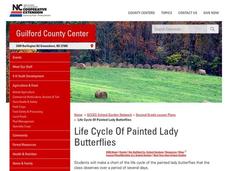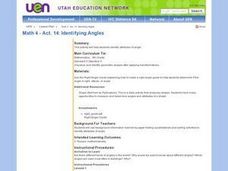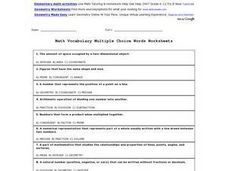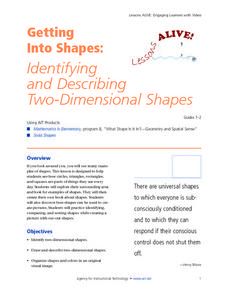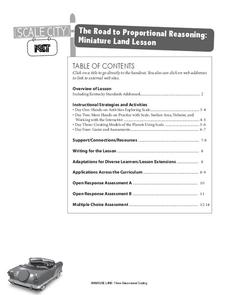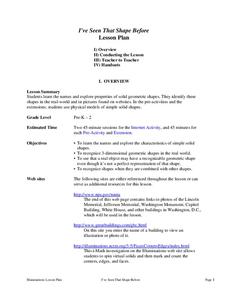Curated OER
Squares to Compare
Students investigate how to draw and classify two and three dimensional figures (squares, triangles, rectangles.)
Curated OER
New Kids on the Block
Second graders identify and describe in their own language, the following 2-dimensional and 3-dimensional shapes: triangle, square, oblong (non-square rectangle), circle, oval, pentagon, hexagon, diamond, box, cylinder, and sphere. They...
Curated OER
Experiencing 3D
Students explore photography by utilizing digital cameras. In this 3 dimensional instructional activity, students create eye glasses using red and blue acetate in order to view 3-D images. Students utilize computers and digital cameras...
EngageNY
How Do 3D Printers Work?
If we stack up all the cross sections of a figure, does it create the figure? Pupils make the connection between the complete set of cross sections and the solid. They then view videos in order to see how 3D printers use Cavalerie's...
NC Cooperative Extension, Guilford County Center
Life Cycle Of Painted Lady Butterflies
The Very Hungry Caterpillar is the inspiration for this project-based learning activity. Kindergartners create a lifecycle chart for a butterfly with four sections: egg, caterpillar, pupa, and butterfly. It is a three-dimensional...
Curated OER
Identifying Angles
Fourth graders discuss and examine examples of the different types of angles. After learning the names of the geometric shapes students identify the types of angles and then complete the Kidspiration activity, Identifying Angles.
Curated OER
Math Vocabulary Multiple Choice Words Worksheet
In this math vocabulary worksheet, students complete multiple choice problems where they match the correct math vocabulary word to its definition. Students complete 15 questions.
Futures Channel
Folding Circles
Students investigate properties of circles. In this geometry activity, students differentiate between similarity and congruence as they observe polygons. They investigate properties of two and three dimensional shape.
PBS
Surface Area and Volume
You and your class will like this lesson on using visual models to relate the volume and surface area of solid shapes. Learners construct three-dimensional forms using nets. They calculate the surface area and volume for each and then...
Bright Hub Education
Math Lesson for Visually Impaired Early Learners: A 3 Way Counting Activity
A unique lesson that's designed for visually impaired early learners, but can be adapted for anyone, is here for you. Pupils use brightly colored foam letters, beads, checkers, and an abacus, in order to gain practice in identifying the...
Curated OER
Getting Into Shapes: Identifying and Describing Two-Dimensional Shapes
Young scholars examine their classroom to find examples of various types of shapes. After identifying and describing the various shapes, they draw as many as they can on a piece of paper. They organize them into an image based on their...
Curated OER
3-Dimensional People
Students collect objects that represent themselves. In a class discussion, they consider how they are seen and understood by others. Students create two sculptures, one of how others see them and another of how they see themselves.
Curated OER
Sky 3: Modeling Shadows
Students will construct models to demonstrate their understanding of shadows. Many questions and suggestions for variants on the activities are presented to allow you to tailor this lesson to your particular needs. It is best to make the...
Curated OER
Dimensional Analysis
Twelfth graders examine different dimensions and units which go with a particular dimension. They explore the concept of linear measurement versus area. Students estimate area of 3-D objects. They practice converting from one unit of...
Curated OER
Trace a Face
Students find two dimensional shapes in three dimensional figures. They determine the shapes that make up the faces of three dimensional figures of common classroom objects such as crayon boxes.
Kentucky Educational Television
The Road to Proportional Reasoning
Just how big would it really be? Young mathematicians determine if different toys are proportional and if their scale is accurate. They solve problems relating scale along with volume and surface area using manipulatives. The...
Curated OER
What's in the Bag?
Help your students identify the attributes of two-dimensional shapes. They read the book Round is a Mooncake, and use pattern blocks to sort shapes. Students sort shapes according to their attributes.
Fayetteville Public Schools
I've Seen That Shape Before
The objectives in the resource allow young scholars to explore the characteristics of simple solid shapes. Youngsters learn to recognize the face shapes, corners, and edges that make up 3-D figures by filling in a chart....
Curated OER
Embracing Embossing
Students explore the technique of embossing through the use of aluminium foil and a three dimensional collage. For this embossing lesson, students create a sentence with the letters of the word stamp. Students discuss a...
Curated OER
Coordinate Plane
Students use computer applets to demonstrate three dimensional coordinate planes. In this coordinate planes lesson plan, students play a coordinate game and a maze game.
Curated OER
Geometry Gymnastics
Students identify shapes and manipulate 2 and 3 dimensional objects. They view objects from different perspectives and review relative positions (near, far, between). They sing a shape song.
Curated OER
Using Nets to Find Surface Area
Eighth graders explore three-dimensional objects (prisms, pyramids, cylinders and cones) to draw nets. They use the understanding of drawing nets to find the surface area of pyramids and cylinders.
Curated OER
Compass Designs
Young scholars investigate the properties of two and three dimensional objects. In this geometry instructional activity, students differentiate polygons based on similarity and congruence. They make observation and interpret the data.
Curated OER
Boxing On
Students participate in five center activities in which they construct three dimensional objects using cubic centimeter manipulatives such as sugar cubes and toothpaste boxes. They determine the volume of the objects. They build a model...




